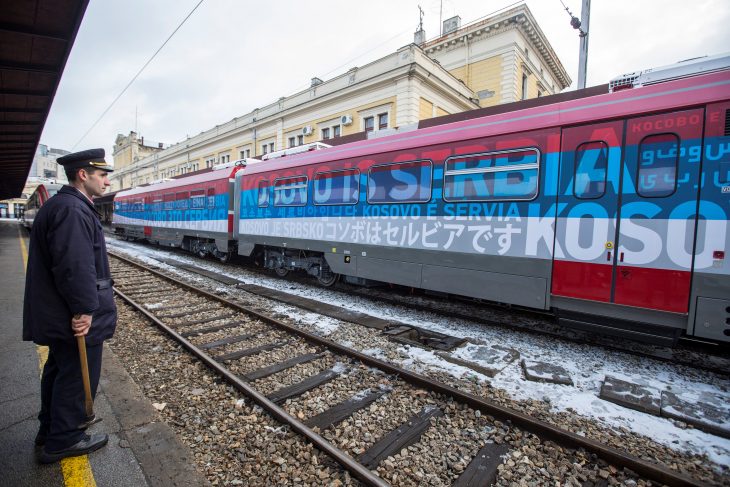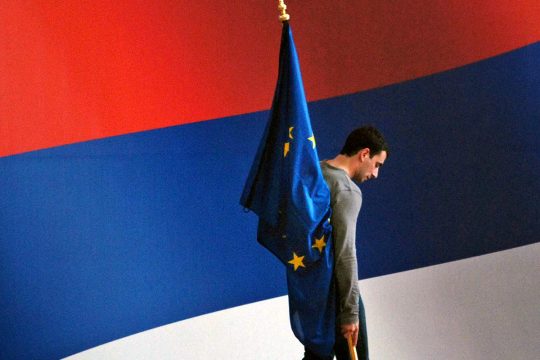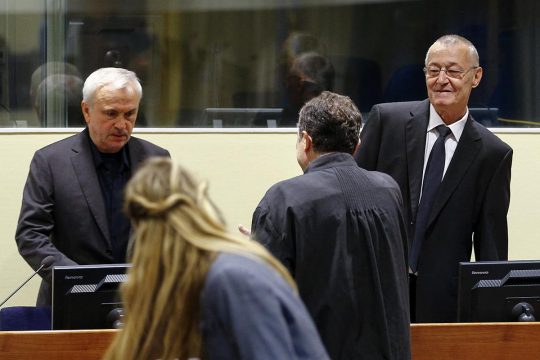A propagandist train, a rising wall and the ghosts of the late 1990s conflict: Serbia and Kosovo are engaged in a disturbing war of symbols and words, unprecedented in recent years.
"Kosovo is Serbia" said a message in 20 languages on the side of a train, painted in the colours of the Serbian flag, which left Belgrade on Saturday, destined for northern Kosovo.
The move was lambasted as a "deliberate provocation" by Kosovo's President Hashim Thaci, who suggested it was part of a plan to annex the Serb-populated north of his country.
"Serbia counts on the assistance of Russia," said Thaci.
A former Serbian province with a predominantly ethnic Albanian population, Kosovo unilaterally declared independence in 2008, a decade after its Albanian insurgents fought the forces of Belgrade's late strongman Slobodan Milosevic.
Kosovo's sovereignty has since been recognised by more than 100 countries, but not by Serbia and its traditional ally Russia.
The train, decorated inside with Serbian Orthodox religious imagery, supposedly represented the freedom of movement of Serb people -- a crucial point in a normalisation process between the two sides that began back in 2011.
Serbian Prime Minister Aleksandar Vucic eventually halted the train before it crossed the border but he also upped the pressure, saying he took the decision to "avoid a conflict and save lives" based on fears the train would be attacked.
He accused the Kosovo government of sending police units to the north to "provoke a wide-ranging conflict", alleging plans to blow up the tracks that were denied by Pristina.
- Ready to send army -
"We do not want war, but we will even send the army if needed to protect Serbs from possible killings," Serbian President Tomislav Nikolic told reporters on Saturday.
Speaking to Western diplomats the following day, Kosovo's Foreign Minister Enver Hoxhaj said that Belgrade's actions towards Kosovo "show that Serbia wants to ignite new conflicts".
Belgrade and Pristina both aspire to join the European Union, and EU-brokered talks between the two sides since 2011 have led to greater freedom of movement and goods and improved police cooperation.
But nearly 20 years after the Kosovo war in which 13,000 people were killed, progress has stalled.
The disputes are accumulating: Kosovo's citizens were outraged at the January 4 arrest in France of former premier Ramush Haradinaj on suspicion of war crimes, owing to an international arrest warrant issued by Belgrade.
A former head of the insurgent Kosovo Liberation Army (KLA), Haradinaj has been released on bail but cannot leave France while an extradition request from Belgrade is examined, which could take months.
He has twice before been tried and acquitted by the International Criminal Tribunal for the former Yugoslavia (ICTY) at The Hague.
- Building a wall -
Relations have further deteriorated in the town of Mitrovica in northern Kosovo, where Serb authorities have started erecting a concrete wall on the banks of the Ibar river.
The wall's construction, by a bridge that divides the town's Serb-dominated north and largely ethnic Albanian south, has angered Pristina, which says it is cementing the town's divisions and must be knocked down.
But the mayor of North Mitrovica, Goran Rakic, says the wall is simply practical and will protect pedestrians from traffic.
It is not up to Pristina to decide "what would and what would not be built," he warned.
Kosovo Prime Minister Isa Mustafa said that the issue of the wall "will be settled in accordance with the law".
Serbian political analyst Aleksandar Popov said the renewed tensions could be explained by domestic politics, with Serbia entering a campaigning period ahead of presidential elections in April.
Kosovo remains a sensitive issue 18 years after a NATO bombing campaign against Serbia aimed at ending the war, and Popov said the ruling SNS party wanted to anticipate voters' criticisms over how they have handled Kosovo and relations with Europe.
Belul Beqaj, a political sciences professor in Kosovo, said Belgrade's leaders had a habit of trying to distract voters from internal problems by focusing on Kosovo ahead of elections.
"It is a dangerous game with fire that cannot be fully controlled," he warned.





